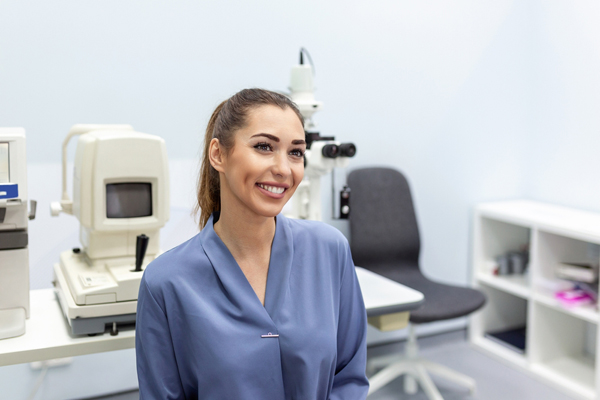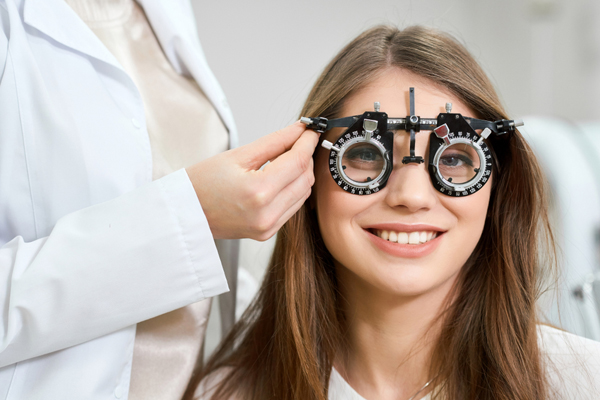How an Optometist Can Help with Myopia

Controlling myopia at an early age can slow down its progression. This can help prevent yearly upgrades for stronger glasses. Your optometrist can help by offering various treatments. If you want to find out how your optometrist can help control myopia, here are the details.
Atropine eye drops
Optometrists use atropine eye drops to achieve short-term myopia control results. Atropine can open up the pupils. It relaxes the focusing process. Receiving atropine is possible in ointment or eye drop form. Apply it once a day as long as the nearsightedness progresses. Atropine treatment does not cure this eye condition.
This effective eye medication can control myopia in most patients. An optometrist can also use it with bifocal lenses. This enhances the effect. The patient can experience more improvements as the treatment goes on.
Distance center multifocal soft contact lenses
Patients can wear these lenses the same way they wear soft contacts. The center of the lenses slows down myopia progression. This type of soft contact lens is becoming more popular. Discussing this with the optometrist can make the patient more aware of the different types available.
Nearsighted patients from six to 12 years old can wear these contacts. Each lens looks like a dartboard. There are several circles within each other. The center or bull’s eye corrects blurry distance eyesight. The outer portions defocus and blur. This mechanism slows down myopia progression.
Orthokeratology
These lenses are also known as CRT (corneal reshaping lenses) or ortho-K. The patient will wear these lenses during evening sleep. They put minimal pressure on the eye’s surface overnight. This results in a temporary change in corneal shape. This provides vision correction to the user the next morning.
The effects of ortho-K lenses last the entire day. The patient does not need to wear corrective lenses anymore during waking hours. The dramatic effects free patients from problems when using contact lenses or eyeglasses. They also make it convenient for active patients to perform sports activities.
Bifocal eyeglasses
Children with esophoria end up wearing different prescription eyeglasses for near and distance vision. This is achievable by using bifocal lenses. Bifocal lenses are effective in managing myopia. Parents whose children have esophoria prefer these eyeglasses. Some children with this diagnosis are too young to use eye drops or wear contact lenses.
Multifocal contact lenses
These lenses control nearsightedness with different powers at different lens zones. Multifocal lenses can treat presbyopia, farsightedness, and nearsightedness. Studies show that these lenses can control nearsightedness in children as well. These lenses also reduce the risk of developing high myopia.
Multifocal eyeglasses
These glasses can also control nearsightedness in children, like multifocal contacts. Multifocal eyeglasses can help patients with presbyopia. These eyeglasses can also slow down myopia progression in children. The effects are slow but effective.
Complications of myopia
Detecting and treating nearsightedness in its early stages is important. It corrects the issue and provides proper vision. It also gives the individual a fair chance in life. Below are some of the possible complications of this condition if it does not have early treatment:
This is the clouding of the eye’s lens. It happens naturally with age. Nearsightedness makes cataracts form earlier. Early signs include constant changes in prescription glasses and increased glares at night. Cataract surgery can remove the blurry lenses and replace them with new ones.
Retinal detachment or tear
The thinner retina elongates in this condition. This increases its risk for detachment, tear, or hole formation. Retinal detachment needs treatment right away. The eye doctor must reattach the detached layer. The treatment will prevent permanent vision loss in the affected eye.
The macula is the part of the eye that gives clear vision. High myopia causes an increase in axial lengthening. This may lead to retinal thinning and stretching, which will cause vascular changes.
Myopic tractional maculopathy
The inner retinal layers try to pull away from the outer layers as the eye elongates. This causes retinal thickening. The eye doctor needs to monitor this condition because it may lead to complications.
This involves an increase in fluid pressure within the eye structure. In severe cases, myopia increases one’s risk of having glaucoma. Without treatment, this eye condition will cause blindness. Glaucoma is a silent worker. It often happens slowly without symptoms until the later stage.
Myopia is a growing problem, and your optometrist can help control it
The mentioned ways of controlling nearsightedness are effective. Your optometrist will need to check your child’s eyesight first to determine which treatment will apply. The progress of the treatment will depend on the regular eye checks. It will also be helpful to follow the optometrist’s instructions on how to care for, use, and maintain the myopia control device.
Get more information about Bright Eyes Optometry in Mt Vernon at https://brighteyesmv.com.
Check out what others are saying about our services on Yelp: Read our Yelp reviews.
Recent Posts
Emergency eye care is needed if you find yourself dealing with a problem with your eye that causes pain or affects your vision. Failing to treat eye injuries as soon as they are detected can lead to permanent consequences, like reduced vision or blindness. Common eye injuries that require emergency eye care include: Exposure to…
Looking for more information on eye protection? An ophthalmologist knows everything there is to know about protecting the eyes. While there are a few different types of eye care professionals, ophthalmologists are eye care professionals who have undergone additional years of education and training so they can offer their patients both medical and surgical eye…
Another word for an itchy eye is ocular pruritis. It is a common health situation in many people. Itchiness in your eyes is more than enough reason to see an optometrist. Receiving prompt treatment is important in receiving prompt relief. If you want to know what causes an itchy eye and the treatments for it,…
An ophthalmologist is a medical or osteopathic doctor who specializes in eye and vision care and is licensed to practice medicine and surgery. Eye care is an important part of one's overall health care. Read on to learn more about choosing the right eye-care professional for you.During a checkup, the eye doctor will first take…



